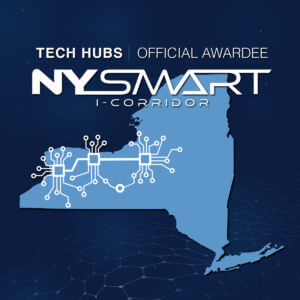Buffalo-Rochester-Syracuse One Of Only 12 Winners From Across The Nation For Highly Competitive Federal Grant
Blog Categories
July 8, 2024

SCHUMER, AFTER YEARS OF ADVOCACY, ANNOUNCES BUFFALO-ROCHESTER-SYRACUSE TECH HUB FIRST IN THE NATION TO WIN PRESTIGIOUS $40 MILLION AWARD FROM HIS CHIPS & SCIENCE LAW TO POWER UPSTATE NY AS SEMICONDUCTOR SUPERHIGHWAY – TRAINING WORKFORCE, BOOSTING MANUFACTURING AND INNOVATION, & STRENGTHENING AMERICA’S CHIP SUPPLY CHAIN
Schumer Created The Tech Hubs Program With Upstate NY In Mind, Fighting For Years To Land The Designation And Pulled Out All The Stops To Make The Buffalo-Rochester-Syracuse Region First Winner From His CHIPS & Science Law
Now Buffalo-Rochester-Syracuse One Of Only 12 Winners From Across The Nation For Highly Competitive Federal Grant – Putting National Spotlight On Region As The Epicenter For America’s Semiconductor Future; With Fed $$ Now Flowing For Workforce Training, Attracting New Companies, Boosting Innovation
Schumer: A Monumental Win For Upstate NY As First Major Tech Hub Award In The Nation From My CHIPS & Science Law
After years of relentless advocacy and landing the prestigious federal Tech Hub designation for the Buffalo-Rochester-Syracuse that he created in his CHIPS & Science Law, U.S. Senate Majority Leader Chuck Schumer today announced the “NY SMART I-Corridor Tech Hub” was just selected as one of only 12 Tech Hub award winners in the nation, bringing a major $40 million in federal funding to further position Upstate NY as a semiconductor center for the world.
Schumer said this prestigious and highly competitive federal investment will supercharge Upstate NY to build out its workforce training initiatives, strengthen existing manufacturing and innovation, and help attract new supply chains from the billions in private and federal semiconductor investment the senator has helped bring to the region, helping ensure this industry that is critical to our nation’s future, and that once was being lost to overseas, now is not just made in America, but made in Upstate NY.
“This is a monumental victory for the Buffalo-Rochester-Syracuse region as the first major Tech Hub award in the nation, bringing a whopping $40 million from my CHIPS & Science Law. With this major investment, the feds are shining a national spotlight, and confirming what I have long known, that America’s semiconductor future runs through the heart of Upstate NY along the I-90 corridor.,” said Senator Schumer. “From the fields near Syracuse that will become Micron’s massive mega-fab to the cutting-edge research labs in Rochester and workers learning these manufacturing skills in Buffalo, this award helps connect the region to seize this once-in-a-generation opportunity and establish Upstate NY as the heart of America’s semiconductor industry. I created the Tech Hubs competition with Upstate NY in mind, and pulled out all the stops to win this award –first proposing this program in my Endless Frontier Act, then passing it into law as part of my CHIPS and Science Act, making the case to bring the region together, advocating at the highest levels and delivering the transformational investment to make today possible. It’s never been more clear: the heart of America’s semiconductor industry runs along the I-90 corridor in Upstate NY!”
Today’s award is the culmination of years of work by Schumer both creating the program through his CHIPS & Science Law with Upstate NY in mind, and working meticulously to lay the foundation for the region to succeed in securing this award. Going back to before the creation of the program, Schumer cited Upstate NY as ready to compete, and began working to build the coalitions to come together to be ready to tap the federal funding award, including landing major grants like $25 million from the American Rescue Plan for Buffalo to boost its growing tech industry, while simultaneously working to land major companies in the semiconductor and related industries in the region from Micron’s massive over $100 billion federal investment in Central NY to Edwards Vacuum in Western NY.
Thanks to Schumer’s efforts, the multi-region consortium beat out nearly 400 initial applications in the first phase of the Tech Hubs competition and was one of only 31 proposals selected for the prestigious federal Tech Hub designation that allowed them to compete for the funding awarded today. This fits together with billions in private and federal investment Schumer has helped deliver for Upstate NY, and companies we are seeing already expand in the region. Just after receiving the Tech Hub designation, Schumer announced TTM Technologies intends to build an up to $130 million, 400 job high-tech manufacturing facility in Central NY, citing the Tech Hub designation as a reason for wanting to locate in Upstate NY.
This is on top of other major investments in the semiconductor industry, including GlobalFoundries plans to invest over $12 billion to expand and construct a second, new state-of-the-art computer chip factory in the Capital Region, Wolfspeed recently opening the first, largest, and only 200mm silicon carbide fabrication facility in the world in the Mohawk Valley, and Menlo Micro investing $50+ million to build their microchip switch manufacturing facility near Ithaca, creating over 100 new good-paying jobs. In addition, major supply chain companies like Edwards Vacuum is making a $300+ million investment to build a dry pump manufacturing facility in Western NY, creating 600 good-paying jobs to support the growing chip industry in Upstate New York. Niacet Specialty Chemicals also announced an investment of $50 million in its Niagara Falls facility to strengthen the semiconductor manufacturing supply chain, and Corning Inc., which manufactures glass critical to the microchip industry, is investing $139 million in Monroe County – creating over 270 new, good-paying jobs, and many more.
The $40 million in Tech Hubs funding will go towards specific component projects that aim to solve the growth challenges the region would otherwise face over the coming decade and ensure that growth is translated to all members of our communities. Specifically, the component project efforts will be led by Monroe Community College, the University at Buffalo (UB), and Syracuse University, all of which will be coordinating across the region to bolster workforce training initiatives, help elevate local supply chain companies, create a collaborative ecosystem for semiconductor R&D commercialization. According to the proposal, by the end of the decade, 25% of all chips produced in the United States will be manufactured within 350 miles of this Tech Hub, – with no other region in the nation accounting for a greater share of microchip production.
The NY SMART I-Corridor Consortium Tech Hub spans across the Buffalo, Rochester, and Syracuse region and has engaged 100+ institutions, including assembling commitments from industry, academia, labor, non-profit, government, and other private sector members. The implementation phase of the program will allow the region to expand the semiconductor ecosystem already in existence to develop and make the future of semiconductor technology in Upstate NY.
The funding award today will focus on key areas across all regions including:
- Workforce Training: led by Monroe Community College, the workforce training program will create a variety of initiatives, including expanding internship and apprenticeship opportunities; establishing a program to pair industry partners with semiconductor supply chain firms to develop training and job placement efforts; and creating employer-led training initiatives at regional training and education institutions to expand the workforce. Fabs and suppliers in the corridor will face a gap of over 10,000 jobs by 2034 that requires immediate action to train workers for 5,000 middle-skill jobs like electrical assemblers and processing technicians, 4,000 construction jobs like electricians and welders, and 2,500 high-skill engineering jobs like industrial engineers and software developers. This initiative, called STEP UP (Semiconductor Talent & Employer Partnership in Upstate New York) will focus on meeting this need to close these critical gaps in upskilling, hiring, and retention, especially for populations that have been historically excluded from tech and manufacturing related job opportunities. Partners will also work through New York State’s ON-RAMP program alongside, community-based organizations (CBOs), and training providers to recruit from historically underserved communities and provide wraparound services.
For example, STEP UP personnel will help employers hire and retain talent by engaging with each of the over 100 existing I-Corridor employers to develop strategies to meet their talent needs, including identifying relevant training programs, and where the programs do not yet exist, helping employers define minimum viable skills to inform new programs. STEP UP will provide initial seed funding to pilot industry-aligned programs and certificates, replicate proven models, such as Onondaga Community College’s electrical tech AA degree developed with Micron and the partnership now between MCC, Genesee Community College, and Erie Community College to work with other semiconductor supply chain companies in the region to train and hire workers.
STEP UP will also develop new curricula or certification programs that workers will need to be placed into semiconductor jobs. For example, MCC plans add new curriculum and credentialing programs to their existing Optical Systems Technology Program. MCC is the nation’s only community college awarding associate degrees in precision optics. Many of these graduates today are employed at I-Corridor chip supply chain manufacturers like Corning and Optimax, however fabs will also need specialized types of optical technicians since chip manufacturing involves many optical/photonic processes like lithography. MCC can leverage their only-in-the-nation optical program and the state-of-art equipment in the MCC FWD (“Forward”) Center in downtown Rochester to work with industry to design new curriculums that can be used by MCC and other training providers in the Tech Hub Corridor to train workers in Buffalo, Rochester, and Syracuse.
- Supply Chain: Led by UB, this component would aim to close gaps in the supply chain by making it easier for local firms to gain access to growth opportunities in the semiconductor industry. Federal funds will be allocated to scale capacity at three regional Manufacturing Extension Partnerships; increase visibility of new opportunities; track regional growth opportunities; and assist firms with access to capital for the growing semiconductor industry.
This would help leverage the 100+ existing semiconductor suppliers around in the region to help them expanding their capabilities and help other legacy manufacturers upscale to enter into the semi supply chain. This will help link the already robust manufacturing environment with supply chain opportunities associated with the presence of new major semiconductor companies like Micron coming to the region. This initiative will help guide manufacturers through assessments to understand how their products fit into the broader semiconductor supply chain and develop pathways for each manufacturer to obtain the right certifications and other expertise necessary to make them eligible to sell into these fabs.
- Commercialization: led by Syracuse University, this project will coordinate the Tech Hub’s key commercialization assets and facilities across academia, government, and industry to help startup, small- to mid-size, and minority-owned businesses access critical resources for semiconductor-related innovation and entrepreneurship. These businesses commonly face significant barriers to successful commercialization, including the scarcity and expense of state-of-the-art equipment and facilities, limited capital availability for research, development and prototyping, lack of participation from underserved and underrepresented populations, and more. To close those gaps, this project will expand access to semiconductor commercialization resources that startup, small- to mid-size, and minority-owned businesses can use to help bring their ideas to market more successfully.
For example, a new innovation voucher program will help small and minority-owned businesses afford access to commercialization resources by subsidizing their use of laboratory and prototyping resources needed for testing semiconductor related technologies. This project also aims to increase access to critical commercialization resources by creating a centralized inventory of I-Corridor commercialization assets and facilities that businesses can view and book through an online public portal, and by establishing an “innovation concierge” to help businesses navigate the portal and drive awareness of entrepreneurial support in underrepresented communities. In addition, the project will finance semiconductor-related research experiences like internships and co-op’s for underrepresented students, and standardize inter-institutional IP-sharing to help collaborators identify, mitigate, and avoid the bottlenecks that commonly delay R&D, frustrate business development, and disincentivize investment.
The Tech Hub has assembled many of the country’s leading semiconductor-related commercialization resources as partners for the project, including INFICON’s state-of-the-art tools and cleanrooms, SUNY ESF and Clarkson University’s Healthy Water Solutions, Cornell’s NanoScale Facility, the University of Rochester’s URNano, NY CREATES Albany Nanotech Complex, AIM Photonics Test Assembly and Packaging facility, Luminate’s Optics, Photonics, and Imaging Startup Accelerator, NYSTAR’s Centers for Advanced Technology and Centers of Excellence, and more.
The application was led by three designated conveners, one from each region: Buffalo Niagara Partnership in Buffalo, ROC2025 in Rochester, and CenterState CEO in Syracuse. Members of the consortium include semiconductor manufacturers and supply chain business like Micron, Wolfspeed, Global Foundries, Menlo Microsystems, INFICON, Corning, Optimax, AMD, TTM Technologies, Saab, Akoustis, L3Harris, Lockheed Martin, Edwards Vacuum, Danfoss, Linde, Lifatec, Indium and SRC; business organizations like CenterState CEO, NY Photonics, Buffalo Niagara Partnership, and Rochester Technology and Manufacturing Association (RTMA), Buffalo Niagara Manufacturing Alliance (BNMA), and the Greater Rochester Chamber of Commerce; education and research institutions like University at Buffalo, University of Rochester, Rochester Institute of Technology, Monroe Community College, Syracuse University, Cornell University, Clarkson University, Le Moyne, SUNY Polytechnic Institute, SUNY Oswego, SUNY ESF, SUNY EOC, and Onondaga Community College; workforce development and labor partners like Northland Workforce Training Center, RochesterWorks, RMAPI, UNiCON, WNY Area Labor Federation, Central-Northern New York Building and Construction Trades Council, IBEW; philanthropic and community partners like Buffalo Manufacturing Works, the John R. Oishei Foundation, M&T Bank, NY CREATES, Empire State Development; and many more.
Leaders from across New York applauded this major funding being awarded:
“With this transformative federal grant, New York is taking another major leap toward building Chips Country in our state,” Governor Hochul said. “This award will help to bring the next generation of semiconductor research, manufacturing, and workforce training upstate and unlock even more funding -- on top of our other state investments – to attract chipmaking businesses and jobs. From Micron’s historic investment to our first-in-the-nation chips research center in Albany, New York is all in on semiconductors and I thank the Biden administration, Majority Leader Schumer, Senator Gillibrand, and Congressman Morelle for ensuring we remain competitive in the global race for chips business.”
“The financial investment from the Federal Government validates our strategy to advance the designated Tech Hub. The collaboration and dedicated work that brought us here serve as the catalyst for this transformational opportunity within the I-SMART corridor. We have the necessary components to lead the resurgence of advanced manufacturing and semiconductor production in the U.S.,” said Dottie Gallagher, President and CEO of the Buffalo Niagara Partnership. “This moment marks a turning point for our region, presenting significant economic opportunities for all. The consortium of 100 partners across industry, education, and philanthropy, along with bipartisan support from our federal officials, made today a reality. This is just the beginning of our effort to transform the economics of Western and Central New York. None of this would have been possible without Senator Schumer's visionary leadership in creating the Tech Hubs program.”
“The I-Corridor is now one of a few federally funded Tech Hubs, which is a firm signal to the world that this region is primed to lead the resurgence of advanced manufacturing and semiconductor production in the U.S.,” said Robert Simpson, President of CenterState CEO. “This investment in our strategy ensures that the very communities once left behind can now regain their rightful economic leadership position. The partnerships, collaboration, vision and leadership of our community, philanthropic, educational, business, and elected officials are the true legacy of this work, and we are grateful to all for their commitment to our shared success. We particularly acknowledge the unwavering leadership of U.S. Senator Charles Schumer who co-authored the CHIPS and Science Act and Tech Hubs programs specifically with the intent of helping to reignite the innovation economy in parts of the country that had been previously left behind. His support and commitment have ensured this region has the resources needed to drive long-term progress. While we may now take a moment to celebrate this historic opportunity, we are more ready than ever to get to work and leverage this investment to maximize the economic impact that will be felt across our communities.”
“Today’s announcement that the NY SMART I-Corridor is among the handful of newly funded Federal Tech Hubs validates the power of collaboration, and serves as a significant inflection point for our entire region,” said Dr. Joseph Stefko, President of ROC2025 and NY SMART I-Corridor Tech Hub Regional Innovation Officer. “Three years ago we set out to build a new, coordinated vision for the Buffalo-Rochester-Syracuse corridor, one laser-focused on advancing semiconductor production and supply chain. The targeted investments this Hubs funding enables – in workforce, innovation, and advanced manufacturing – position us to lead the way across the full semiconductor value chain, and in so doing, expand economic opportunity for all across our entire corridor. I’m indebted to the 100-member consortium that helped bring this vision to life and create a groundbreaking new framework for regional collaboration. I’m especially grateful to Senator Schumer, whose vision served to create this opportunity and whose fierce and consistent advocacy, alongside that of Congressman Morelle and our entire delegation, ensured our bid rose to the top. And to the Biden Administration, the Commerce Department, the Economic Development Administration, and the Tech Hubs Program office – we’re enormously grateful for the confidence you’ve placed in our bid. And we’re ready to get to work.”
“Western New York has shaped our nation’s destiny for centuries, from the Erie Canal to Bethlehem Steel. The NY SMART I-Corridor Consortium Tech Hub will pave the way for us to once again lead the country forward into a new age of supply chain independence, technological innovation, and entrepreneurship,” said Congressman Tim Kennedy. “With our strong transportation system, network of research universities, and diverse workforce, the I-Corridor is poised to transform Western and Central New York’s economy and create a new generation of good-paying jobs. Thank you to Majority Leader Schumer for leading the charge in creating the CHIPS and Science Act and for his strong advocacy for Western New York.”
“The NY SMART I-Corridor Consortium Tech Hub is in its infancy and this funding will aid immensely in helping the Hub get ready to take its first steps, building up the necessary infrastructure and environment between the many involved sectors to foster sustainable long-term growth,” said Erie County Executive Mark Poloncarz. “Through the expansion of existing systems and the creation of new partnerships and opportunities made possible by this funding, the Tech Hub will be better positioned in coming years to handle ‘growing pains’ as it positions Upstate NY as a leader in the semiconductor technology field. I thank Senator Schumer for securing this critical funding to move the Tech Hub forward.”
Onondaga County Executive Ryan McMahon said, “Onondaga County and Central New York are experiencing a comeback so big that just a few years ago nobody thought it was possible. We are not just growing, we are surging! Thanks to Micron, we are now America’s hub for memory semiconductor manufacturing in addition to hosting thriving aerospace, defense, advanced manufacturing, and other high tech industries. To meet the growing labor demand of the companies here today, and those that will soon to call our community home, we will need partners at all levels of government to come together. Today, thanks to the relentless advocacy of Senator Schumer, the New York Smart I-Corridor Tech Hub will have access to tens of millions of dollars to ramp up our workforce efforts for the jobs of today and tomorrow. I applaud Senator Schumer and all of our government, academic, labor, and other community partners who helped realize this incredible moment.”
Mayor Byron W. Brown said, “I am extremely grateful to the U.S. Economic Development Administration for their selection of NY SMART tech hub in this year’s tech hub competition. This award will bring in federal funding that will make our region one of the leaders in the semiconductor industry, a business with ever growing possibilities. I would like to thank NY Senator Chuck Schumer, and Dottie Gallagher of the Buffalo Niagara Partnership for leading the charge on this successful bid.”
“On behalf of our entire University at Buffalo community, I would like to acknowledge and thank Senate Majority Leader Schumer for his steadfast support of UB, and his bold vision for the Buffalo-Rochester-Syracuse region,” said University at Buffalo President Satish K. Tripathi. “Through Senator Schumer’s CHIPS & Science Law, the NY SMART I-Corridor Tech Hub will transform our region into a national center for semiconductor manufacturing bolstered by a robust supply chain and a dynamic workforce. As a member of this regional partnership, UB is honored to harness our expansive research portfolio and our university/industry partnerships in order to help restore America’s leadership in semiconductor manufacturing, cultivate the economy of the future and enhance our nation’s security.”
“Syracuse University is proud to lead this higher education collaboration that will help drive innovation and establish the NY SMART I-Corridor as a world leading entrepreneurial incubator for the semiconductor industry,” said Syracuse University Chancellor Kent Syverud. “I am grateful for Senator Schumer’s steadfast advocacy. This substantial new grant builds on major investments the University is making. It will help create critical high-tech infrastructure and facilities, attract top semiconductor manufacturing researchers and faculty to the region, and develop unique experiential learning and internship opportunities for talented students.”
“The efforts led by Senator Schumer in the Tech Hub designation are key to the growth of the technology industry in upstate New York and for SoPark Corporation, a MWBE company,” said SoPark CEO Rupa Shanmugam. “This initiative will be essential for us to support the demands of advanced technologies.”
“Today’s federal funding is a game-changer for Western New York’s workforce,” said WNY AFL-CIO President Peter DeJesus. “This investment in the Buffalo-Rochester-Syracuse Tech Hub will directly empower our region, enhancing workforce training opportunities, advancing research initiatives, and creating exciting job opportunities. It’s a significant step forward for our community, demonstrating our capability to lead in advanced manufacturing and attract key industries to Western New York. We deeply appreciate Senator Schumer’s leadership in creating and securing these crucial resources."
“This historic federal investment will ensure the Buffalo-Rochester-Syracuse region’s semiconductor and sensing industries continue to lead our nation in innovation over the next decade and beyond,” said Congressman Joe Morelle. “I’m grateful to the Biden Administration, Secretary Raimondo, and the Economic Development Administration for selecting our application and recognizing the promise our region holds. I look forward to continuing my work with Senator Schumer and our bipartisan colleagues to advance innovative technologies, propel Upstate New York’s growth, and secure our nation’s economic future.”
Greater Rochester Chamber of Commerce President and CEO Bob Duffy said, "Being named a winner of the Regional Tech Hub Awards is a game-changer for our region. This recognition underscores our commitment to innovation and sets the stage for unprecedented growth and opportunity. We are deeply grateful for the visionary leadership of Senator Schumer and Congressman Morelle. Having the Senate Majority Leader from New York is an incredible advantage, bringing national attention and resources to our State. The unwavering support of Senator Schumer and Congressman Morelle has been instrumental in driving our tech community forward, and this award is a testament to their dedication to fostering technological advancement in our region."
“We want to thank Senator Schumer and other legislative leaders at national, state, and local levels for recognizing Monroe Community College’s transformative role in the development of the NY Smart I-Corridor,” said Dr. DeAnna R. Burt-Nanna, Monroe Community College President. “By being Monroe County’s leading developer of highly skilled employees for the semiconductor industry through our workforce training programs, we are amplifying the strength of Monroe Community College’s readiness and consistent track record of championing innovation.”
"Today, the real work begins as we move towards transforming our region into the leading semiconductor manufacturing hub in the United States.” said Rochester Institute of Technology President David Munson. “This designation underscores RIT’s shared mission to educate the next generation of students poised to shape the future of the semiconductor industry. I want to thank Leader Schumer and Congressman Morelle for their tireless efforts that helped the NY SMART I-Corridor Tech Hub become a reality. We would not be here today without their leadership and unwavering support for our historic Buffalo-Rochester-Syracuse collaborative effort.”
Matt Hurlbutt, CEO of Greater Rochester Enterprise said, “Senator Schumer's support has been instrumental in securing the NY SMART I-Corridor's designation as a national Tech Hub. Leading companies like Edwards, Corning, AMD, D3, Optimax, and Rochester Precision Optics are drawn to the Greater Rochester, NY region due to its talented workforce, university-led R&D assets, and unique concentration of advanced manufacturing, sensing, optics, photonics, and imaging expertise. This designation, coupled with the anticipated financial support, will further accelerate the region's robust semiconductor supply chain ecosystem and drive innovation. GRE looks forward to working with federal, state, and local partners to leverage this investment in support of more business growth and job creation throughout the region.”
“We are grateful for Majority Leader Schumer’s vision and tireless efforts to make New York the nation’s leading hub for advanced semiconductor R&D and manufacturing. Corning’s Fairport and Canton facilities produce specialty glass and precision optical lenses that are critical to making the world’s most complex microchips. This Tech Hub designation will ensure that both Corning and New York continue to be global leaders in the semiconductor industry well into the future,” said Wendell P. Weeks, Chairman and CEO, Corning Incorporated.
“As a lead partner of the NY SMART I-Corridor consortium, the University of Rochester is beyond excited by today’s transformational announcement and I thank the Economic Development Administration for recognizing our potential with this award,” said University of Rochester President Sarah Mangelsdorf. “I firmly believe that no region has more momentum as a center for innovation-led growth, and this funding will enable us to leverage our collective strengths and assets to build an ever-better future together as a global leader in semiconductor research and manufacturing. I commend Senator Schumer’s vision and leadership in establishing this program through the landmark CHIPS and Science Act, as well as his efforts to highlight the Buffalo-Rochester-Syracuse region’s potential to be a hub of semiconductor innovation. I also want to recognize the unwavering support from local champions like Congressman Morelle who brought the region together and have us poised for success.”
Gregory Lancette, President of the Central and Northern New York Building and Construction Trades Council said, “I would like to thank Senator Schumer for his relentless efforts to establish America’s new semiconductor superhighway to transform Upstate NY’s post-industrial rust belt into a global epicenter for semiconductors and related technologies. United States industrial leadership has been built on the backs of labor for generations, and today the building and construction trades are hard at work casting our nation’s industrial future one brick, pipe, or wire at a time. To that end, the Central New York Building and Construction Trades Council is honored to be collaborating with Senator Schumer and over 100 exceptional government, business, and community leaders from across the region that have partnered to realize the NY SMART I-Corridor Tech Hub. Now that Upstate NY’s Tech Hub has been both designated and funded by the US Commerce Department, CNNYBCTC stands ready to support it to the fullest extent possible. On behalf of labor across CNY, I applaud Senator Schumer for making this all possible by passing his historic CHIPS and Sciences Act to create the Tech Hubs program, landing massive investments from companies like Micron, Global Foundries, Edwards Vaccum and more, and never losing sight of the microelectronics fueled future that has put Upstate NY in the national spotlight.”
###
Related Posts
Empowering Young Professionals to step into advocacy
How does business advocacy actually work? And why should young professionals take interest?
Those were the driving questions behind Be The Change, a high-energy informational event hosted by the Buffalo Niagara Partnership’s Young Professionals (YP) group. Held at The Establishment, this members-only session gave attendees a behind-the-scenes look at how business advocacy shapes the regional economy, and how emerging leaders can play a role in that impact.
CEOs Speak: A cautious rise in optimism
At our recent CEOs Speak event—the only forum in Buffalo Niagara showcasing the results from the annual Upstate New York Business Leader Survey—local leaders delivered a powerful message: optimism is cautiously rising, but government intervention remains a persistent obstacle to regional economic growth.
Legislative priorities: BNP’s reaction to the Executive Budget
On February 14, we set the stage for critical discussions about the future of New York State’s economy by convening regional business leaders and policymakers, along with BNP members, at the 1970 Club in KeyBank Center for our Legislative Luncheon.
2025 Advocacy Agenda: Shaping the future
On Jan 9, our signature Government Affairs event unveiled the strategies and priorities that will guide our work this year with policymakers.




